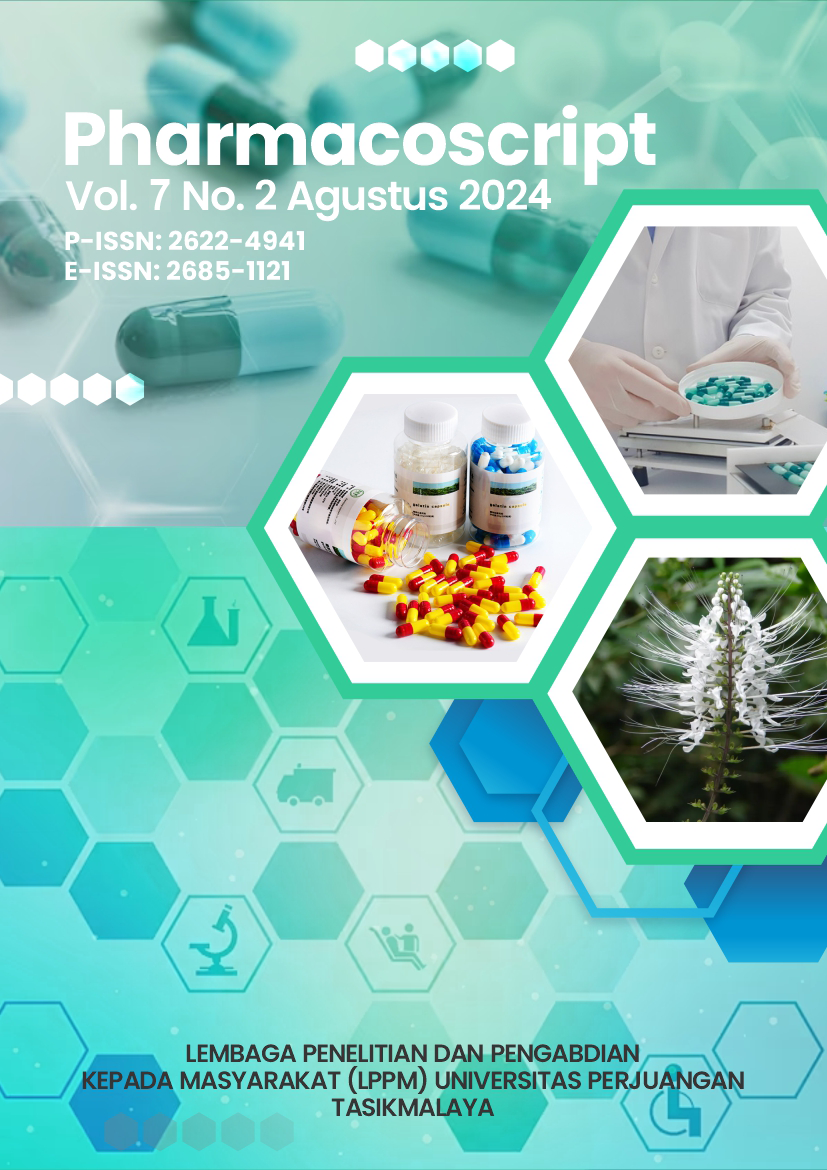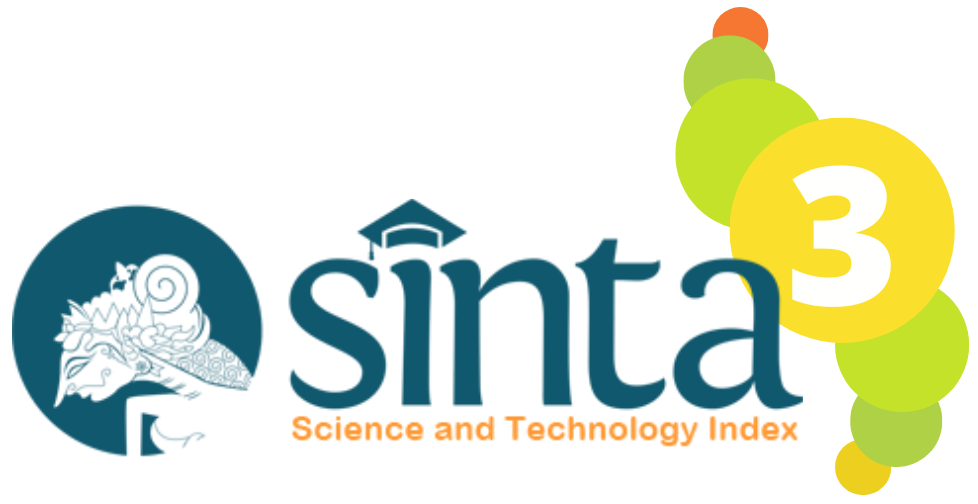PENGETAHUAN DAN SIKAP TENAGA KESEHATAN TERHADAP OBAT HALAL DI KOTA SAMARINDA
DOI:
https://doi.org/10.36423/pharmacoscript.v7i2.1777Keywords:
Apoteker, Dokter, Obat Halal, Pengetahuan, SikapAbstract
Produk farmasi halal mendapatkan perhatian yang signifikan dalam beberapa tahun terakhir karena meningkatnya permintaan akan produk yang sesuai dengan prinsip Islam. Sebagai pemangku kepentingan utama dalam industri pelayanan kesehatan, petugas kesehatan memainkan peran penting dalam memastikan keselamatan dan kesejahteraan pasien, khususnya dokter dan apoteker sebagai lini terdepan. Penelitian ini bertujuan untuk menilai tingkat pengetahuan dan sikap tenaga kesehatan terhadap obat halal, menggali pemahaman mereka tentang obat halal dan sikap mereka terhadap peresepan dan pemberian produk tersebut. Metode penelitian observasi secara cross sectional menggunakan kuisioner terhadap 58 apoteker dan dokter di kota Samarinda yang ditentukan secara purposive sampling. Beberapa karakteristik responden juga dianalisis selain tingkat pengetahuan dan sikap. Tingkat pengetahuan dan sikap ditentukan dengan analisis univariat sehingga diperoleh bahwa sebaran tingkat pengetahuan apoteker dan dokter yang tergolong tinggi, secara berurutan yaitu 89,4% dan 85,2%. Begitu pula sikap apoteker dan dokter juga tergolong tinggi terhadap obat halal, secara berurutan yaitu sebesar 82,4% dan 87,5%.
References
Ahmad, N. A., Abaidah, T. N., & Yahya, M. H. (2013). A Study on Halal Food Awareness Among Muslim Customers in Klang Valley. 4th International Conference on Business and Economic Research (pp. 1073-1087). Bandung: Universitas Muhammadiyah Purwokerto.
Arikunto, S. (2010). Prosedur Penelitian : Suatu Pendekatan Praktik, Ed. Rev.2010, Cet.14. Jakarta: Rineka Cipta.
Azwar, S. (2010). Sikap Manusia: Teori dan Pengukurannya, Ed.2, Cet.1. Yogyakarta: Pustaka Pelajar.
Boniol, M., McIsaac, M., Xu, L., Wuliji, T., Diallo, K., & Campbell, J. (2019). Gender equity in the health workforce: Analysis of 104 countries. Switzerland: World Health Organization.
Cohen, L., Manion, L., & Morrison, K. (2007). Research Methods in Education, 6th Edition. London, UK: Routledge.
Pusat Komunikasi Publik Sekretariat Jendral Kementerian Kesehatan. (2014, Maret 04). Sehat Negeriku. Retrieved Juni 2023, from https://sehatnegeriku.kekmkes.go.id/baca/rilis-media/20140304/4510042/hanya-tiga-jenis-obat-yang-mengandung-babi/
Maharani, A. F., Afriandi, I., & Nurhayati, T. (2017, Desember). Pengetahuan dan Sikap Tenaga Kesehatan Terhadap Pengelolaan Limbah Medis Padat pada Salah Satu Rumah Sakit di Kota Bandung. Jurnal Sistem Kesehatan, 3(2), 84-89.
Menkes. (2023). KEPUTUSAN MENTERI KESEHATAN REPUBLIK INDONESIA NOMOR HK.01.07/MENKES/13/2023 TENTANG STANDAR PROFESI APOTEKER. Kementerian Kesehatan Republik Indonesia. Jakarta: Kementerian Kesehatan Republik Indonesia.
Muiz, A. (2020, Januari). Landasan dan Fungsi Al- Qawa’id Al-Fiqhiyyah dalam Problematika Hukum Islam. al-Afkar, 3(1), 103-114.
Paramitha, M., & Ressandy, S. S. (2021, 12 29). Identifikasi Kehalalan Kandungan Obat dan Pengetahuan Apoteker terhadap Obat Halal di Klinik Graha Respirasi Semesta Samarinda. Borneo Student Research, 3(1), 986-1001.
Rachmawati, W. C. (2019). Promosi Kesehatan dan Ilmu Perilaku. Malang: Wineka Media.
Rahem, A., Effendi, M. H., & Faridah, H. D. (2021). Analysis of pharmacists’ knowledge and attitude in the pharmaceutical industry of halal certification and their readiness to produce halal medicine. IAI Conference 2020. 21 (2), pp. 1-7. Pharmacy Education.
Rochmanto, B. A., & Widiyanto, I. (2015). Pengaruh Pengetahuan Produk dan Norma Religius Terhadap Sikap Konsumen dalam Niat Mengkonsumsi Produk Makanan dan Minuman Halal. Diponegoro Journal of Management, 4(1), 1-12.
Septiani, D., & Ridlwan, A. A. (2020). The Effects of Halal Certification and Halal Awareness on Purchase Intention of Halal Food Products in Indonesia. Indonesian Journal of Halal Research, 2(2), 55-60.
Trisnawati, A., & Kusuma, A. M. (2018). Tingkat Pengetahuan, Sikap, dan Persepsi Tenaga Kesehatan terhadap Kehalalan Obat di Rumah Sakit Kabupaten Banyumas. Jurnal Ilmiah Farmasi Farmasyifa, 1(1), 1-12.
Udayana, I., & Ramadhan, D. (2019). Pengaruh Perceived Usefullness, Perceived Ease Of Use, dan Subjective Norm Terhadap Purchase Intention Melalui Attitude Sebagai Mediasi. Jurnal EBBANK, 10(2), 41-48.
Wahyudi, P. (2024, Agustus 6). Tanya Expert Part 1 – Mulai dari Regulasi hingga Tantangan Sertifikasi Halal Obat. Retrieved Agustus 2024, from LPPOM MUI: https://halalmui.org/tanya-expert-part-1-mulai-dari-regulasi-hingga-tantangan-sertifikasi-halal-obat/
Downloads
Published
Issue
Section
License
Copyright (c) 2024 Suparningtyas Juniza Firdha, Janggo Abdul Rahman, Rijai Laode

This work is licensed under a Creative Commons Attribution-ShareAlike 4.0 International License.
Authors who publish with this journal agree to the following terms:
- Authors retain copyright and grant the journal right of first publication, with the work [SPECIFY PERIOD OF TIME] after publication simultaneously licensed under a Creative Commons Attribution License that allows others to share the work with an acknowledgement of the work's authorship and initial publication in this journal.
- Authors are able to enter into separate, additional contractual arrangements for the non-exclusive distribution of the journal's published version of the work (e.g., post it to an institutional repository or publish it in a book), with an acknowledgement of its initial publication in this journal.
- Authors are permitted and encouraged to post their work online (e.g., in institutional repositories or on their website) prior to and during the submission process, as it can lead to productive exchanges, as well as earlier and greater citation of published work (See The Effect of Open Access).









